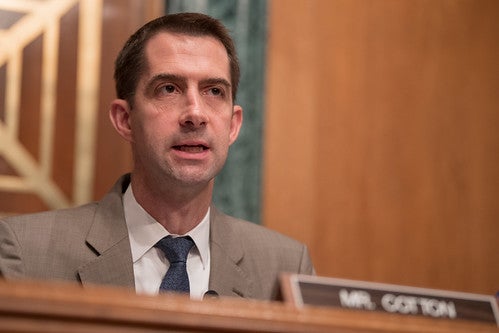
Huawei 5G and its Impact on US F-35 Deployments to the UK
Cotton made the comments while giving evidence to Parliament’s Defence Select Committee during a hearing discussing the security of 5G. During the debate, the topic of how allowing Huawei into the 5G network could hamper relationships across the Atlantic was addressed.
Cotton warned that the deployment of Huawei 5G technology could allow hackers from the People’s Liberation Army to track the movements of parts used for the F-35.
He said: “I fear China is trying to drive a high-tech wedge between us [the US and UK] with Huawei.”
During the hearing, the Senator said that as the US pivots its focus to meeting the challenge posed by China in the Pacific, keeping US forces in the UK was already becoming a point of debate. He added that the UK’s decision to allow Huawei to build aspects of the UK’s 5G network added to the risks of deploying forces here.
Cotton compared using Chinese 5G equipment to allowing Russia to build NATO submarines during the cold war. Cotton said it: “would be as if we had relied on adversarial nations in the cold war to build our submarines, or to build our tanks. It’s just not something that we would have ever considered.”
In January, UK Prime Minister Boris Johnson announced that Huawei would be allowed to build non-core sections of the UK’s 5G network. The amount of Huawei equipment that can be installed on the network is capped at 35%.

US Tariffs are shifting - will you react or anticipate?
Don’t let policy changes catch you off guard. Stay proactive with real-time data and expert analysis.
By GlobalDataCotton has been a vocal critic of Huawei and China, and in the past has condemned the UK decision to use Huawei equipment. After Johnson announced his decision in January Cotton said: “This decision is deeply disappointing for American supporters of the Special Relationship. I fear London has freed itself from Brussels only to cede sovereignty to Beijing. Allowing Huawei to build the UK’s 5G networks today is like allowing the KGB to build its telephone network during the Cold War.
“The Chinese Communist Party will now have a foothold to conduct pervasive espionage on British society and has increased economic and political leverage over the United Kingdom. The short-term savings aren’t worth the long-term costs. In light of this decision, the US Director of National Intelligence should conduct a thorough review of US-UK intelligence-sharing.”
Cotton told the committee that he was not speaking on behalf of the US Government but that the views he was expressing were shared by several people in Washington DC.
The comments follow after Cotton backed an amendment to the 2021 National Defence Authorisation Act (NDAA) that would block the deployment of US F-35s to any country that utilises 5G equipment built by the Chinese telecoms provider.
The US Air Force operates out of several bases owned by the Royal Air Force and routinely deploys fighter jets and strategic bombers to the UK to maintain an aerial presence in Europe. At present, the US is set to deploy F-35 fighters to the UK next year.
Responding to the comments Huawei VP Victor Zhang said: “The committee concentrated on America’s desire for a home-grown 5G company that can ‘match’ or ‘beat’ Huawei. It’s clear its market position, rather than security concerns, underpins America’s attack on Huawei as the committee was given no evidence to substantiate security allegations. We welcome open and fair competition as it fosters innovation and drives down costs for everyone.
“Over the last 20 years, we have worked hard with our customers and partners for building Britain’s robust and secure 3G and 4G networks and we are now focused on delivering the 5G network to the same high standards. This is fundamental to achieving the government’s Gigabit broadband target by 2025.”



